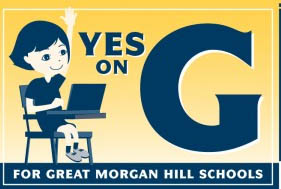Superintendent Wes Smith stayed up until 3:30 a.m. to catch as much as he could of the results for the $198 million Measure G bond that voters approved Tuesday with 64 percent of the vote. It needed 55 percent to pass.
Even in that early hour while in Texas at a national conference, Smith got excited.
“When people come together like that, above all else, we see that they really value kids, and this demonstrates how much they value them,” Smith said Wednesday.
As a means to bypass the uncertainty of the state’s budget, the school board unanimously pushed through the bond measure to the ballot in July, believing in the value of it because the funds will be controlled by the school district and not the state or federal government.
MHUSD is grappling with budget cuts, as is most every other school district in the state. But the most immediate “urgent and critical” needs, as described in a comprehensive project list, boils down to these points, which is how the bond money will be spent in the coming years: Investing in science, technology, engineering and math programs, updating technology, replacing aging roofs, heating, plumbing, and updating fire alarm and security systems.
The 9,000-student school district’s operating budget is $65 million with 80 percent spent on personnel, but the district has made $15.7 million in reductions during the last five years.
The bond will burden homeowners about $59 a year for every $100,000 in assessed value of property. With the median home price at $673,000 in Morgan Hill according to the 2010 U.S. Census, that could mean nearly $400 for the average household per year.
Board Trustee Kathy Sullivan moved to Morgan Hill 18 years ago, when she recognized the town as a wonderful place to live, but “it’s been confirmed again. To see people taking the time to support this and putting their money where their mouth is to support education.”
“For me it was beyond words, which is not usually a problem for me, I’m just so excited and grateful,” Sullivan said.
To dedicate more time to the Measure G campaign, Sullivan decided to not seek a third term – a fruitful decision as it turned out.
“I feel like I’ve done something even after I’m gone,” she said. “I’m really grateful to the community and the people who worked to reach out to people.”
Her eight-year run will end next month when the three newly elected board members will take their seats on the dais.
“It’s the most wonderful way to leave on a high note,” she said.
Former school board hopeful Marty Cheek worked behind the scenes promoting Measure G as he also campaigned for one of the three school board seats. Cheek lost on Tuesday to incumbent Bob Benevento, Jackson Academy of Music and Math parent Rick Badillo and Live Oak parent Amy Porter Jensen.
At Rosy’s at the Beach in downtown on Tuesday night, Cheek had this to say: “It’s doing really well. I think it’s something that’s gonna help a lot of young people in our schools have a better chance and opportunity to excel.”
Another former candidate and also an active parent, Brenda Cayme, who helped to get the word out about voting “yes” on Measure G by calling people and reminding them to vote for the bond, says she absolutely supports the initiative. With two children attending Paradise Elementary, Cayme is well aware of the positive change Measure G could bring about for various MHUSD school sites in dire need of an aesthetic and structural pick-me-up. Cayme placed last in the field of six candidates.
“I don’t think anything has been done to that school in six, eight years,” she said, referring to Paradise. “No maintenance, no painting.”
In July, Sullivan referred to the months of work the board and district did with its consultants, including many of whom were volunteering their expertise and services to the school district.
“We are asking you to put out a little more money,” Sullivan said. “I think the community will respond positively. We didn’t do this lightly.”
The school district conducted a survey of about 400 voters earlier this year and found voters were open to paying a general obligation bond – or money loaned to an agency such as a school district and paid back through taxation – of about $60 per $100,000 of assessed home value. Nearly 60 percent of respondents said they would vote “yes.” That amount would generate up to $195 million.
The bond funds would be spread across all 16 schools within the district, including Central Continuation High School, the historic Machado School and the Charter School of Morgan Hill.
As for the voters of California passing Proposition 30, “Wow,” Smith said. He added that the district did its due diligence in anticipating Prop 30’s failure, including adding an extra furlough day mid-year. Now, however, the furlough day will not happen. If Prop 30 had failed, it would have meant $3.2 million in cuts for MHUSD.
Prop 30 continues a one-fourth sales tax for four years and increases state income taxes for seven years for people who make more than $250,000. The money will be used to balance the state budget.
“That was a surprise, but a welcome surprise,” he said.
The next step for the future of the bond money, which won’t get utilized likely until next school year, is to start up the independent oversight committee as required by law and get the community together to look at the bond master plan and prioritize the projects.
“I realize we’re not where we want to be, so we have to work. But I’m excited about the possibilities ahead of Morgan Hill,” Smith said.








